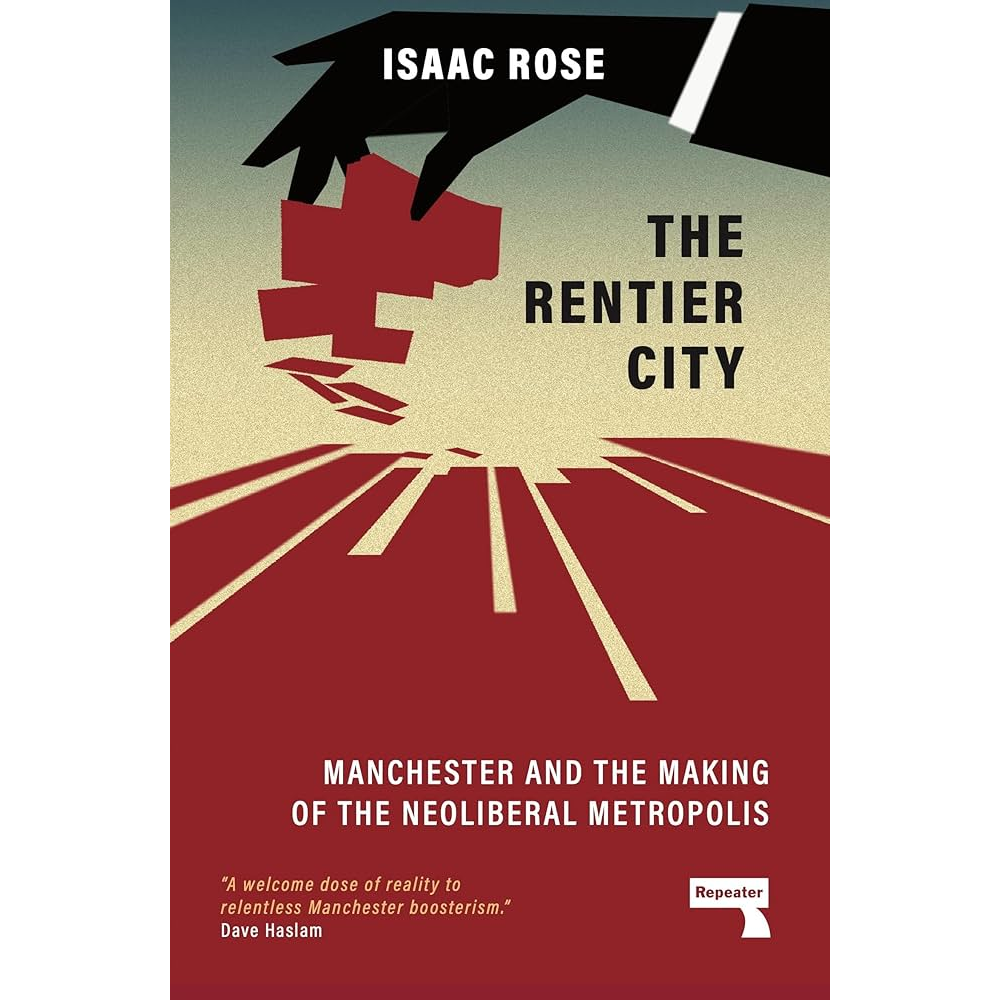Book Review: The Rentier City by Isaac Rose reviewed by James Fishwick

The Rentier City - Manchester and the making of the Neoliberal Metropolis by Isaac Rose is a more than thorough history of the industrialisation of Manchester from its feudal beginnings, technologising and urbanising Victorian period, its 20th century decline to present - arguably back to feudal.
Isaac Rose is a Tenants Union organiser living in Manchester and makes a point of stating he did not grow up in Manchester, but regularly visited the metropolitan centre and it is now where he has called home for the past decade.
Rose aptly frames this history of Manchester through the idea of two eras of circuits of capital: commodity production (producers trading their own products for a profit) and then urbanisation (which Marx viewed as a natural result of the development of productive forces through movement of populations to urban centres), utilising ideas from Marxist geographer David Harvey. These circuits are split by Rose’s ‘Interregnum’ which in my opinion is the stand out section of the book which enables the reader full understanding of the ideas and theory behind Rose’s argument, and describes a decisive crossroad period in Manchester’s story.
We learn about Manchester’s growing industry built on cotton and blood (from various oppressed groups), the growth of radical politics in the city including chartists, early communists and labour movements, and Manchester’s ‘Shock City’ period where explosion in all its metaphorical and literal meaning was occurring in many formats and to varying levels. Think dense, hot and pressure cooker.
Rose’s proposed ‘Interregnum’ of the 1970s-80s was when industrial decline was Manchester’s brand, it was no longer producing capital through commodity and this had severe consequences for the people and laid foundations for neoliberalism to come reaping. Thatcher had gone to war with her ‘three enemies’ (Inner-city uprisings within Black neighbourhoods, Trade Unions, specifically the Miners and New Urban Left on municipal councils) and won, this further marks the transition into the all encompassing nature of what Rose describes as the ‘neoliberal metropolis’.
Entry into the second circuit was coupled with financialisation, the domination of private investment in the public sphere and municipal entrepreneurialism. All aided and abetted by figures in a Labour dominated council who went along with it so as to not miss out. Marked by ‘Right to Buy’, Business Improvement Districts, Private Finance Initiatives, and money from abroad.
A PRESSURE COOKER
Understanding the place of Manchester within the British Empire is important to the growth and modernity of the City. Its primary industry of manufacturing cotton brought from all over the British Empire picked by enslaved people in the horrors of the period, caused factory towers to fly up and dominate the skyline, accompanied by rows and rows of dense terraced housing for workers. Coalfields nearby made the introduction of the steam engine suitable for 24 hour production in the city, employing more workers across different industries and moving populations away from strip farming in the countryside and into an urbanised centre. It is during this rapid period of economic growth a young Friedrich Engels, son of a major German industrial family and later communist theorist, comes to Manchester, and Engels noticed an ‘extreme segregation’ in the city based on the housing and geography. Engels concluded what he saw as ‘social murder’ of the working classes, who were as Rose puts it ‘condemned to death by disease, poverty and overwork’.
Rentierism was the system of the day. Born out of capitalist development and industrialization, exploitation was its game. Rose describes what Landowners and Landlords did then, as they do now, rent out shoddy housing, spend little on repairs and fit as many people into a space as possible. The abysmal state of housing as well as poor sanitation, typhus, tuberculosis and influenza contributed to causing the average age of death for a citizen in Manchester being 17.
Political movements were intensely active in the city and amongst its people. Not just the high politics of Councils, Mayors and undemocratic Corporate Development Boards, but the organisation of working labour, domination of Liberals and Tory politics, and specs of independent socialists and communists being elected to the City Council. These were momentous and tumultuous political moments which culminated in events such as the Peterloo Massacre (1819), huge mobilisation of chartists in the 1830s and 1840s, and a birthplace of British co-operative movements.
Pushing the timeline along to the 20th century, Manchester was designed by national policy and the first of its many slum clearances took place following the 1930 Greenwood Housing Act and the proposed creation of semi-dense housing, owned by the municipality and for working people. Post-WW2, there was a significant expansion of housing alongside the post-war social democratic consensus and the Welfare State.
INTERREGNUM
Thatcher’s coming to power brought with it a new politics that shaped the city. In Chapter Three Rose places in the timeline of the growth and change of Manchester of the rise and fall of the New Urban Left (NUL). Here we see the secondary circuit of capitalism that Rose theorises captures the history of Manchester. Just leaving the post-war social democratic consensus nationally we begin to see the retreat and cutting of the state, mostly led by Thatcherite-neoliberalism, but encouraged by the Labour led council of decades.
Within this interregnum Rose described the growth of the New Urban Left within local council areas, an anti-racist, feminist, anti-homophobic politics inside and outside of the Labour Party. The NUL organised within municipal administration championed public ownership, the welfare state and social housing, opposing policy to the neoliberal political economy being smashed through by Thatcher and as Rose presents the policies and institutions that the working classes generally viewed as oppressing them. In Manchester the New Urban Left on the Council was led by Graham Stringer and Pat Kearney.
Rose identifies that Manchester, like much of the country, was defined in the 1980s by the battles with and fallout from Thatcher’s three major confrontations which shaped the decade. First, inner city uprisings that took place in predominantly Black neighbourhoods (think Toxeth Riots in Liverpool). Second, the Miners’ strike in 1984. Thirdly, battling with Labour-held municipalities against rate-capping and imposition of national government spending restrictions for local councils.
Then BANG, the 1988 Housing Act which Rose calls ‘the extension of the neoliberal agenda in to the heart of urban Britain’, legislation which significantly reduced regulation on what landlords could charge, a policy with layers of consequences especially for the working classes who were already facing significant levels of unemployment due to de-industrialisation.
Rose’s exploration into the next form of the entrepreneurial agenda in Manchester is almost comedic. He describes the many attempts by a pseudo public body, led by supposed titans of business in Manchester made to bid for the Olympics. Three times attempted, three times failed the ‘Manchester Olympic Committee’ attempted to re-create a 1984 LA-style ‘private finance olympics’ almost like capitalism does not breed innovation but can instead waste a lot of money with no results for working people but plenty of consultancy fees for big business.
SECOND CIRCUIT - URBANISATION
Stories localised to Manchester make the majority of Rose’s urbanisation argument. How the 1996 IRA Bomb in the centre of Manchester shaped the city, and how after it was a public-private partnership ‘Manchester Millennium Ltd.’ that was given responsibility to lead regeneration and development. For me this brings into question the use of public-private partnerships now: this was for a bomb but nowadays we seem to use them for any minor situation where rent can be extracted from the public purse.
New Labour continued, even intensified this urbanisation and shaping in the name of the second circuit of capital rather than in the favour of the everyday person. ‘Cool Britannia’ so long as that includes ASBOs, pension fund backed high rises, shadowy financialisation in the name of regeneration for communities and a disregard for local democracy through increased privately led development.
Rose’s assessment of gentrification is a lesson for us all. He argues the term ‘is often plagued with a host of misunderstandings. This is deliberate. It is the direct consequence of the dominance of the property lobby - Britain’s number one industry - in the discourse of public life.’ Presenting a ‘false choice’ of either privately dominated development or more decline for neighbourhoods.
Finally Rose talks about ‘Militant Particularism in the Rentier City’, which British Marxist theorist Raymond Williams defines as “ideals formed out of the affirmative experience of solidarities in one place get generalised and universalized as a working model of a new form of society that will benefit all humanity.” Rose described the many community-resident led actions, throughout Manchester’s history, fighting private development that isn't in the interests of existing residents as a militant particularism. Rose uses the present day ‘Block the Block’ campaign as his final example of a militant particularism. A group fighting to prevent Purpose Built Student Accommodation development that was not in keeping with original plans and was detrimental to the local area and its residents. Rose states that “the ‘local’ out of which militant particularisms are generated is never in and of itself entirely local… In Manchester, this means wrestling closely with those histories of empire have produced formations of capital, class, racialisation and gendering that still shape the city and the ongoing struggles within it.” It is an immense amount of politics to consider and not every social interaction, event or confrontation is about it, but they are definitely influenced by it.
CONCLUSION
It is more than the story about housing in Manchester I thought it was going to be. It is a story about the creeping, all-consuming nature of capitalism, the city as a battleground in political and economic ideas, and the people who enforce the regime or fight against it. It is a history of exploitation and attempts at resistance, and is a lesson for all those involved in the struggle for better housing about the fight they have on their hands.
In this review I have opted to tell you about the wider themes and politics at play, ironically taking the social history contained within the book and turning it on its head. The most important characteristic of this book is the histories of the everyday people in Manchester who formed community groups, housing action groups and tenants unions to do all they could to fight the interests of capital that wanted to consume them.
James Fishwick is a postgraduate student at Manchester University.
#StopTheSCANdal campaign: Mobilising Against Police Use of Biometric Fingerprint and Facial Recognition Technology
The Racial Justice Network and Yorkshire Resists have released a brand new report on the increased use of the Biometric Services Gateway (mobile fingerprinting) by …
Bradford's 'Top of Town' - West Yorkshire Walks
A walk with Jayne Winn from Rooted In and Hawarun Hussain. We started at Bread + Roses on North Parade and walked around the perimeter of …
Will the North get the transport infrastructure we deserve?
Is this what the Northern Powerhouse means to you? Or does Regional Democracy mean a need to renegotiate the power balance further?
A few thoughts …
